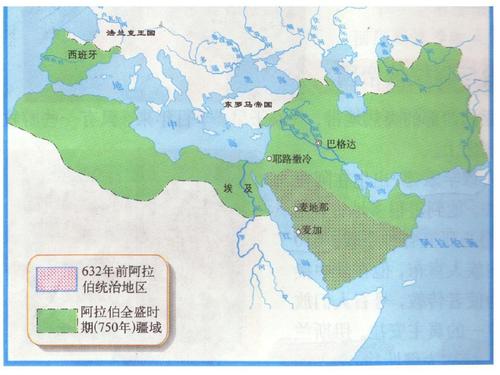After the Arabs rushed out from the depths of the desert of the peninsula, they were overwhelmed, first destroying the Sassanid Persian Empire, and then occupying all of Asia Minor, which originally belonged to the Byzantine Empire.
Sassanid Persia (The Iranian Plateau) was originally Zoroastrian, and Asia Minor was originally Christian (the holy city of Jerusalem is here), but from now on all of these places have been under the control of the Allah.
Now the only obstacle across the Bosphorus is Constantinople, the only gateway from Asia to Europe since ancient times, and if this gate can be broken, Allah will surely envelop the whole of Europe.

In 673 AD, the vast fleet of the Arab Empire attacked the Byzantine capital of Constantinople, and the Greeks fought back, and by 677 AD, the Arabs were defeated and almost completely destroyed. This victory restored the reputation of the Roman army in both the East and the West. The two empires negotiated a thirty-year peace treaty. A small shadow has temporarily appeared on the glorious record of the Arabs.
The Arab Empire temporarily turned the target of its aggression elsewhere. On the basis of the original Egypt, it continued to conquer large areas of territory in North Africa, drove all the Byzantine forces out of Africa, and then crossed the Strait of Gibraltar from North Africa by warship, destroyed the Visigothic Kingdom, and occupied all of Spain. On the battlefield in the East, the Arabs were even more successful, setting off a wave of expansion on a larger scale, annexing all of West Asia and most of Central Asia, all the way to the border provinces of India. He also fought with the Tang Dynasty.
Constantinople
The thirty-year peace treaty between Arabia and Byzantium was effective, and the two countries maintained peace for more than 40 years. The setback in Constantinople left the caliphs of the Arab Empire incredulous, and to the incredulity of is the Islamic theological community, the fact that not all of humanity had converted to Islam or succumbed to Muslim rule. In 717 AD, the current caliph gathered an army of 120,000 men and launched a second attack on Constantinople by land and water, vowing to overcome this huge obstacle to the spread of the Islamic faith to Europe.
When the Byzantine Emperor Leo III received the news, he issued an urgent order that any soldier or civilian, etc., should be able to survive for three years of siege, or else leave the city. The public barns and armories were fully replenished to maintain the maximum stock, the broken walls were fully repaired and strengthened, and the throwing equipment for throwing stones, arrows and fireballs was also installed along the defensive bibliography, and the number of ships was increased in a hurry.
Leo III adopted the policy of "luring the enemy deeper and gathering and annihilating them", ordering the dismantling of the iron chains of the port and allowing the Arab fleet to sail into the harbor; then, unexpectedly, rockets, fireships, and spears were attacked, and the Arab troops and ships were plunged into a raging fire, and the ships that fled in a chaotic situation crashed into each other, engulfed by the waves of the sea, and almost completely annihilated.
The current caliph of the Arab Empire, Soliman, heard the news of the defeat and decided to personally besiege Constantinople with his eastern troops, but unfortunately, he died suddenly and violently in the army due to indigestion. The caliph ate non-stop, and soon he ate two baskets of figs and eggs, plus snacks and sweets. It is said that at one point he ate seventy pomegranates, a lamb, six chickens, and a large number of grapes at a single meal.
The new caliph, Omar II, continued to command troops to besiege Constantinople. This winter was unexpectedly cold, and for more than three months, the ground was covered with thick snow. The Arabs, accustomed to the heat, could not adapt to the weather in Europe, thousands of people died of frostbite, and with shipping cut off, food and grass were not available, the soldiers in the trenches had reached the point of cannibalism. The final result need not be elaborated, the second siege of Constantinople, which lasted for 13 months, ended in the defeat of the Arabs, and the caliph had no choice but to order the Sarkan army.
The Arab Empire was no longer able to move west. The battle had far-reaching consequences, and if Constantinople had fallen, the islamic world's expansion into Europe would have been unimpeded, which could have changed the entire future of the Western world; it was one of the greatest "what ifs" in history.